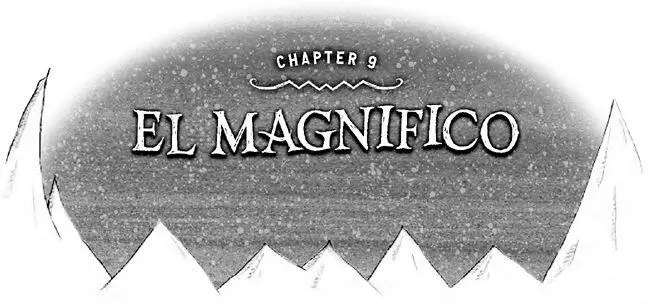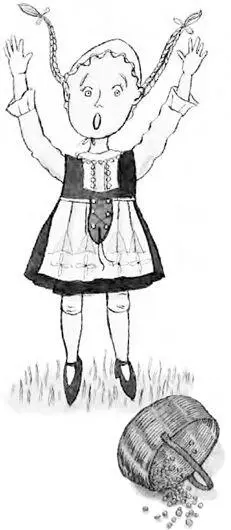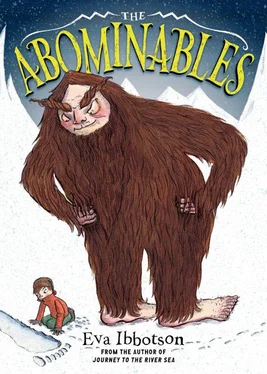So, far from being sent away, Baker and Brutus and Biscuit and Bouncer and Beelzebub became the most famous dogs in the land. Stories were written about them in the papers; they appeared on television; statues of them were put up in the village square. The American who bred them sent the monks even more money so that they were able to build a new chapel with the most beautiful bells that pealed across the valley, and everyone who passed through Feldenberg stopped off and climbed the steep path to the monastery to gaze at the lionhearted dogs. But after the accident to the Englishman and his little boy, no one was allowed to go climbing on Death Peak without a proper guide, so there were no more disasters. Which was just as well, because for the rest of their long and happy lives, Baker had chilblains, Brutus got giddy, Biscuit had to have a night-light in his kennel, and Bouncer refused to get his feet wet. Only Beelzebub got a bit better. Sometimes he would take a little Coca-Cola with his brandy. But only sometimes …
As for Leo, there were no bones broken; he only needed quiet and warmth. But the first night in the hospital in Feldenberg he was restless and stirred in his sleep and said: “My … furry animals … I want … my furry things.” And the night nurse, who knew children who are ill often act younger than their years, went and fetched him a teddy bear from the cupboard in the children’s ward. But fortunately by that time Leo was fast asleep.

 OR TWO DAYS AFTER THEY HAD RESCUED LEOfrom the mountain, the yetis stayed quietly hidden in a thick fir wood on the borders of Feldenberg and Switzerland.
OR TWO DAYS AFTER THEY HAD RESCUED LEOfrom the mountain, the yetis stayed quietly hidden in a thick fir wood on the borders of Feldenberg and Switzerland.
The reason for this was Grandma’s tonsils. After her last great yodel outside the gates of the monastery, Grandma’s tonsils had snapped. At least she said they had snapped, and Grandma wasn’t the sort of person you argued with. Certainly her voice was very croaky; yodeling was out of the question, and she seemed frail and tired. So Perry took the lorry down a long, deserted track leading into the forest and parked it by a disused timber mill and they shut up the lorry and took to the woods.
It was beautiful among the firs. The grass was soft and mossy; there were red and white toadstools, and bilberries, which tasted delicious and made their teeth a rich, dark blue. There was a stream to paddle in and fir cones for Clarence to play with and squirrels to be Ambrose’s friends. Grandma rested and Ellen had a Great Combing of all the yetis so that their fur shone again and their silky hair blew in the wind. She polished Queen Victoria and washed Ambrose’s bedsock and she rubbed Uncle Otto’s bald patch with resin from the pine trees so that it became the most sweetly scented bald patch in the world. Perry stopped worrying about the insides of the wretched lorry and just lay under the trees smoking his pipe and thinking of his Porker. Even Con forgot to be anxious, and when he climbed trees, it was more for fun than to see if anyone was coming.
It is always when you are having a lovely and carefree time that the most unfortunate things happen. On the afternoon of their second day in the woods, they were sitting peacefully by the banks of the stream. Clarence was pretending to catch fish; Perry was strumming his guitar. Even Hubert had sensibly decided that a sawn-off tree stump was not, after all, his mother and was making quite a good job of cropping the grass.
“What will we do on the sixth day?” said Ambrose, rubbing his head against Ellen’s arm.
“On the sixth day you will waltz in the great ballroom beneath crystal chandeliers,” said poor Ellen, who sometimes wished she’d never invented the Farley Towers game.
“What will we do on the seventh—”
“AAAAEEEE!”
The terrified scream rang through the forest, sending Hubert headfirst into a blackberry bush, scattering the birds …
They all scrambled to their feet. Staring at them from the other side of the brook was a fat apple-cheeked girl in a dirndl, carrying a basket of bilberries. Two flaxen braids stuck out from her head, her mouth was open, and her pale blue eyes were wide with terror.
“Mutter! Mutter! Mutter!” yelled the girl and, dropping her basket, she turned and fled screeching through the forest.

“I don’t call that a mutter,” said Ambrose, who was rather hurt at the way she was carrying on. “I call that a scream.”
But Perry, his face serious, said Mutter was German for “mother.” The girl was looking for her parents. And when she had found them …
“Back to the lorry at once, at once!” said Con, all his old worries flooding back. “Oh, quickly, quickly. ”
And, gathering Hubert up as they fled, the yetis followed him.
Even Perry was disturbed by what had happened. “If the kid saw the lorry and connected it with the yetis … and if her parents believe her and don’t just think the yetis were wild bears … it could be awkward.”
“Awkward! It could be a disaster,” said Con, sitting pale as death beside Perry and blaming himself again and again for not having kept a better lookout in the woods.
“They could make me open up the lorry,” Perry went on. “And even if they don’t harm the yetis, there’s all that business about quarantine. No animal’s supposed to come into the country without at least six months in quarantine. If they are animals. On the other hand, if they’re people, they’re illegal immigrants, so at best they’d be sent straight back.”
“Isn’t there anything we can do?” said Con frantically.
“Well …” said Perry, his forehead furrowed. “If they spotted that the lorry is British, they’ll be expecting us to go north, straight through Germany or France and on to one of the Channel ports. Suppose we turn west instead, and go out through Spain? There’s a new ferry service from Vigo that takes heavy lorries. It’s a heck of a long way round, but I reckon we’d have a better chance of getting through without any questions being asked.”
So the yellow lorry turned westward toward Spain. Spain is a beautiful country with famous castles, carved balconies, vineyards, and chestnut groves.
But there was one thing about Spain that they had forgotten …
They reached the little town of Santa Maria in the late afternoon. Flags were flying, a band was playing in the park, and the streets were packed with gaily dressed people buying doughnuts and nougat and fizzy lemonade from market stalls.
“Oh, heck,” said Perry, “we’ve hit a bullfight day. It’s going to take us ages to get through this traffic.”
“A bullfight?” said Grandma, when Con repeated this to the yetis in the back. “But bulls shouldn’t be allowed to fight. Why doesn’t someone throw a bucket of cold water over them?”
Con bit his lip. “It isn’t the bulls fighting each other. It’s … people fighting the bulls.”
“But that’s surely very dangerous. And very foolish,” said Uncle Otto. “Bulls are stronger, and have horns.”
So Con tried to explain. “It’s a sort of sport. They choose a very strong, fierce bull and lead him into the bullring, which is a huge place a bit like a football stadium. And there are these people called picadors, who ride horses and have spears to jab into the bull and make him angry. And then some other people called banderilleros come and stick arrows into the bull’s neck and then when he’s very tired, the top bloke, who’s called a matador, makes him charge and kills him with his sword.”
Читать дальше


 OR TWO DAYS AFTER THEY HAD RESCUED LEOfrom the mountain, the yetis stayed quietly hidden in a thick fir wood on the borders of Feldenberg and Switzerland.
OR TWO DAYS AFTER THEY HAD RESCUED LEOfrom the mountain, the yetis stayed quietly hidden in a thick fir wood on the borders of Feldenberg and Switzerland.











